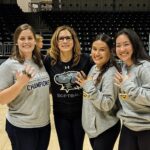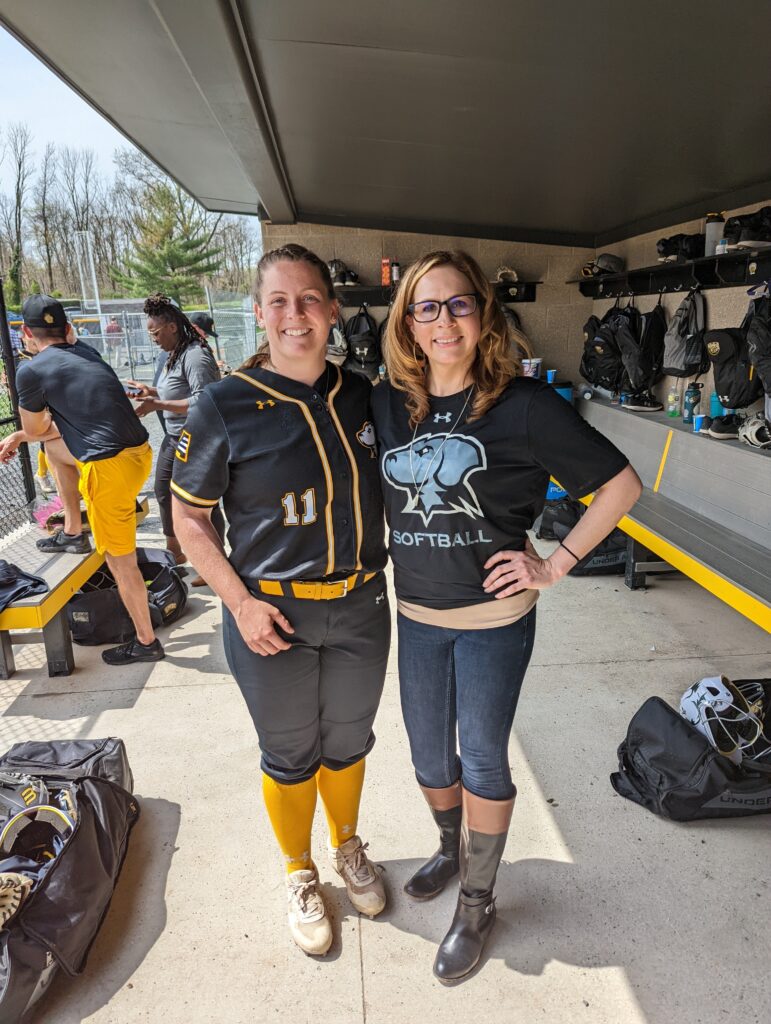
In spring 2022, UMBC softball swept all three tournament games to win their third America East championship. The Retrievers held their opponents scoreless, becoming the first team in conference history to achieve this milestone. And no one cheered louder for their success than Jamie Gurganus, faculty in engineering and computing education and mechanical engineering. Decked out in softball gear (and now with a championship ring necklace gifted from the team engraved with “Prof. G”), Gurganus ’04, M.S. ’11, Ph.D. ’20, mechanical engineering, ended her inaugural semester as honorary faculty coach to the record-breaking team on a high note. (UMBC Softball would go on to nab a fourth consecutive America East championship in 2023.)
But beyond cheering on their successful teams, how do honorary faculty coaches “coach” their teams? Enter Adriana Mason, associate athletic director for academics, who originally envisioned the role of “faculty liaison honorary coaches” lending their expertise to UMBC’s 17 Division 1 teams—maybe not moving magnets around a tactics board and giving game instructions but providing another listening ear and being a loud member of the cheering section.
“The goal is to foster and strengthen the relationships between athletics and academics. Sometimes there can be a disconnect, so we really wanted to try to build that bridge,” explains Mason, who initiated this program alongside Athletic Director Brian Barrio.
Since spring 2022, each UMBC athletic program has had its very own faculty coach. While “coach” may be in the title, squad selection, tactics, and practice plans are still in the hands of professionals.
 Gurganus with Logan Hawker ’22, catcher on the UMBC Softball team.
Gurganus with Logan Hawker ’22, catcher on the UMBC Softball team.
When she met the softball team, Gurganus (known as “Prof. G” to many) made it a point to ask each team member. “‘Who are you? Tell me about your major.’ I blocked out time to figure out who every single person was.”
“You have to be the initiator because sometimes they don’t know how to approach you,” says Gurganus. “I came down wearing a softball shirt, and I’m like ‘I’m one of you.’”
“When we were assigned her, I thought it’d be like the university saying, ‘Hey, professor, you have to be the honorary coach.’ But when she’s coming in so often and actually talking to us, and complimenting us, we can tell she actually wants to be here,” says first-year softball player Mikayla Bryant, chemical engineering.
It’s not only about the winning moments—Gurganus is no fair weather fan. During a recent tough moment for the team, “she showed up,” shares Bryant. “It wasn’t like she was forced to be there, but she had some words of advice for us and that was really nice. At that moment everyone was like, ‘Wow, she’s really here for us.’”
Coaches have also witnessed the benefits of the initiative. “We have several students who have a close relationship with her and, more as a mentor or a sounding board for different things going on in their own lives,” says UMBC softball Head Coach Chris Kuhlmeyer, who has led the team to four consecutive championships.
Honorary faculty coaches have their own reasons for wanting to participate in the initiative.
“Honestly, there are research centers that if I wanted to do pure research, I could go do that,” explains Jeff Leips, honorary coach of the UMBC swim and dive team and biological sciences professor. “But when I’m sitting here alone in my office thinking about science, and then I go talk to the team, that’s a great break.”
For Leips, the chance to get out of his office and “doing what I can to promote learning in whatever environment that I can,” is what taking on this role has been all about.
“It definitely changed my thinking about how to facilitate the learning environment for athletic students,” says Gurganus.
Even though the faculty coach initiative is still in its infancy, Leips and Gurganus see the potential for UMBC to continue leading the way in student support. “We can come together to help support these students in a bigger way, and a very non-traditional way, unlike any other university, I think,” says Gurganus.
— Eric Widemann ’21





